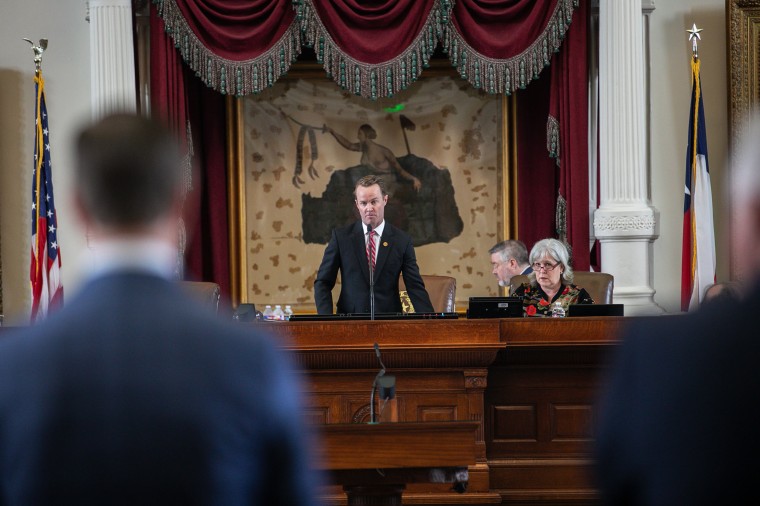After more than two decades of dominating Democrats and ruling over all three branches of state government, the Republican Party of Texas has gone to war with itself.
Stark battle lines have been drawn between mainline Texas conservatives and a more far-right faction that has gained influence within the party in recent years — mirroring the ideological fractures that left Republicans in Washington unable for weeks to elect a new U.S. House speaker after they ousted Rep. Kevin McCarthy.
The Texas GOP’s civil war has been building for years, inflamed in part by an expansive network of ultra-conservative activist groups bankrolled by a trio of West Texas billionaires on a mission to push the deep-red state even further to the right.
After The Texas Tribune reported this month that some of the leaders of that influential far-right network met for hours with the white supremacist provocateur Nick Fuentes — who has praised Adolf Hitler and called for a “holy war” against Jews — the intraparty tension reached a breaking point.
This week, Texas House Speaker Dade Phelan, a staunch conservative who’s nonetheless a target of far-right attacks, called on the state GOP to cut ties with any groups and individuals who have embraced white nationalist figures or rhetoric.
In an interview, Phelan said Republicans must remove “the rot” that he says has been festering for years within his own party or risk ceding control to extremists — a fight that he believes should serve as a warning for the GOP nationally.
“This is an inflection point here in the state of Texas,” Phelan said. “And as Texas goes, a better part of the country goes.”
Cal Jillson, a professor of political science at Southern Methodist University, near Dallas, said the open warfare in the Texas GOP is, in part, a microcosm of Republican politics more broadly in the years since former President Donald Trump’s rise to power helped elevate more extreme elements of the party.
“The Republicans in Texas have an opportunity,” Jillson said, “to look at the dysfunction in the U.S. House and say, ‘Oh, sh--, that is the direction in which we’re headed,’ and to blink hard twice and ask themselves whether that’s actually where they want to go.”
The national Republican Party has tacked harder right in recent decades, but in Texas, the shift has been supercharged by spending from three West Texas billionaires, Tim Dunn and the brothers Farris and Dan Wilks, who have expressed the view that Texas state government should be guided by biblical values. Over the past two decades, they’ve poured more than $100 million into a network of dark money groups and activist organizations — including the political action committees Empower Texans and Defend Texas Liberty — as part of a relentless campaign to push mainstream Texas Republicans to adopt more hard-line positions.
The megadonors, none of whom responded to messages requesting comment, seem to have gotten results. Under Phelan’s leadership, Texas Republicans have passed some of the most conservative state laws in the country in recent years, effectively banning most abortions a year before the U.S. Supreme Court overturned Roe v. Wade and clearing the way for residents to carry guns without permits, among other policies.
Nevertheless, the Wilks and Dunn network has continued attacking Phelan and other Republicans over their failure to approve a policy giving parents public funding to send children to private schools and over the Texas House’s vote this year to impeach Attorney General Ken Paxton — a Donald Trump acolyte who aided the former president’s efforts to overturn the 2020 election — on charges of bribery and other misconduct.
“They keep moving the line for what it means to be conservative,” said Brandon Rottinghaus, a political scientist at the University of Houston. “And if you aren’t on the right side of that line, then you’re going to get the spear.”

Under pressure from Wilks- and Dunn-funded groups, Republicans in the Texas Senate voted to acquit Paxton on the impeachment charges last month, further inflaming tensions within the party. Afterward, Jonathan Stickland, the leader of Defend Texas Liberty, vowed to pour the PAC’s money into unseating Phelan and every other Republican who supported Paxton’s impeachment.
“You and your band of RINOs are now on notice,” Stickland tweeted at Phelan on Sept. 16, using the acronym for Republican In Name Only. “You will be held accountable for this entire sham. We will never stop.”
Three weeks later, The Texas Tribune photographed Stickland and other officials connected to the Wilks-Dunn network meeting with Fuentes, the Nazi sympathizer, at Stickland’s offices in North Texas, giving Phelan and other more moderate Republicans ammunition to fire back. Texas GOP Chairman Matt Rinaldi, who’s among those calling for Phelan’s ouster, was photographed at the same location but has denied meeting with Fuentes.
After news of the gathering exploded through Texas media, Dan Patrick, the Defend Texas Liberty-endorsed lieutenant governor, said he spoke to Dunn, who told him the meeting was “a serious blunder” and assured him that the PAC would have no “future contact” with Fuentes.
But a review of social media posts and recorded comments by officials in the Defend Texas Liberty orbit reveals a deeper embrace of white nationalist rhetoric and ideas. Chris Russo, the president of Texans for Strong Borders, a Defend Texas Liberty-funded anti-immigrant activist group, was photographed chauffeuring Fuentes to the meeting with Stickland.
Texans for Strong Borders didn’t respond to requests to interview Russo. On Wednesday, the Tribune, quoting two of Russo’s associates, reported that Russo has used anonymous social media accounts to praise Fuentes and rail against immigration, feminists, the LGBTQ community and Black people.
Texans for Strong Borders hasn’t hidden its views. The anti-immigration group’s public social media feeds are littered with posts espousing foundational white nationalist positions, including the racist “great replacement” conspiracy theory, which falsely claims white people are being replaced in America through mass immigration as part of an elaborate plot by powerful elites. Extremism experts warn that the belief has inspired violence against people of color, including when a gunman killed 23 people at a WalMart in El Paso, Texas, in 2019 and last year when a shooter targeting Black people killed 10 at a grocery store in Buffalo, New York.
In a video posted this summer to Texans for Strong Borders’ TikTok account, Ella Maulding — an online influencer who has publicly praised Fuentes as “the greatest civil rights leader in history” — rejected the idea of America as a melting pot, arguing it was founded as “a sovereign Christian nation” meant to serve “a people of distinct culture, history and identity.”

Some leaders of the Republican Party of Texas have openly embraced Texans for Strong Borders. Early this month, Rinaldi, the Texas GOP chairman, co-signed a letter with Russo, the Texans for Strong Borders president, calling on Gov. Greg Abbott to stop the flow of migrants at the southern border. In the letter, Rinaldi and Russo asked Abbott to support a controversial bill that would give state and local police unprecedented power to jail or deport undocumented immigrants, which opponents warn could lead to racial profiling and the separation of children and parents in families with mixed immigration status.
Rinaldi didn’t respond to an interview request. In an email, James Wesolek, a Texas GOP spokesman, denied that the party was directly affiliated with Texans for Strong Borders and provided a link to a social media post by Rinaldi denouncing Fuentes and calling for Phelan’s resignation.
Jillson, the political expert, said those revelations — like Trump’s presidency — are shining light on the tacit connection that has long existed between the far-right wing of the Republican Party and white supremacy. And that, he said, appears to be forcing a reckoning.
This week, Patrick, the lieutenant governor, took steps to disassociate himself with extremists in his party, vowing to “root out this cancer” of antisemitism in the GOP and announcing that his campaign would purchase $3 million worth of Israel bonds — the amount donated to him this year by Defend Texas Liberty.
But Phelan said much more is needed to send a clear signal that the Republican Party, both in Texas and nationally, won’t align with extremists.
On Monday, he called for Rinaldi to resign as party chairman, for Republicans to return any donations they’ve received from Defend Texas Liberty and for the PAC and affiliated groups like Texans for Strong Borders to be dissolved.
“They finally got caught,” Phelan said. “They finally got exposed for who they are, and I think a lot of Republicans across Texas are finally opening their eyes.”
CORRECTION (Oct. 27, 2023, 11:46 a.m. ET): A previous version of this article misstated how many people were killed in a mass shooting at a WalMart in El Paso in 2019. Twenty-three people died, not 22.

